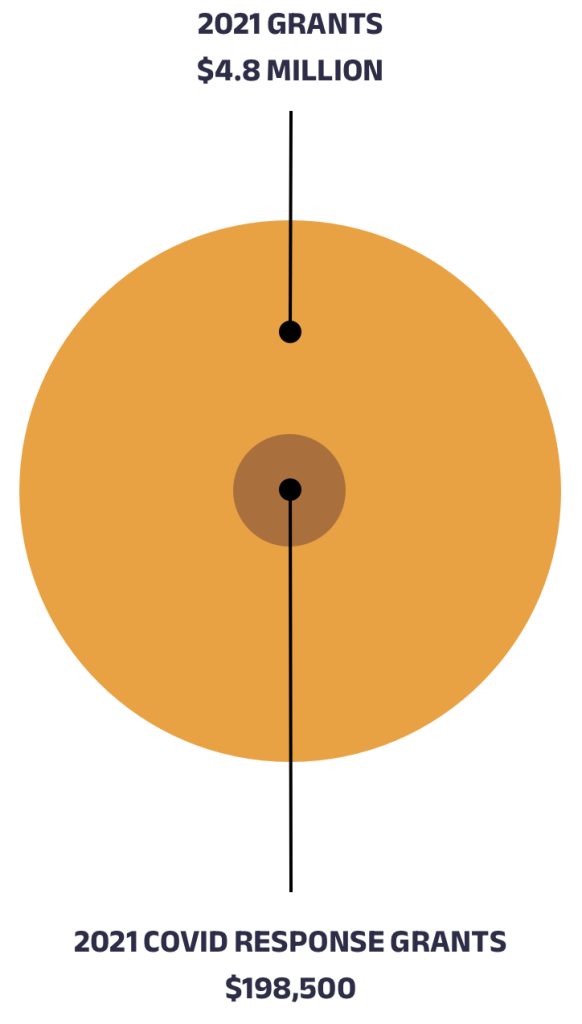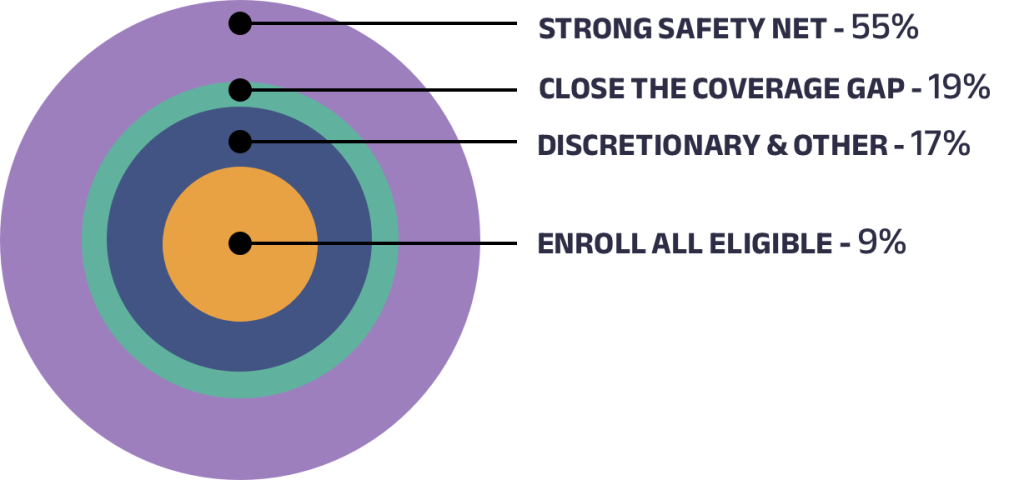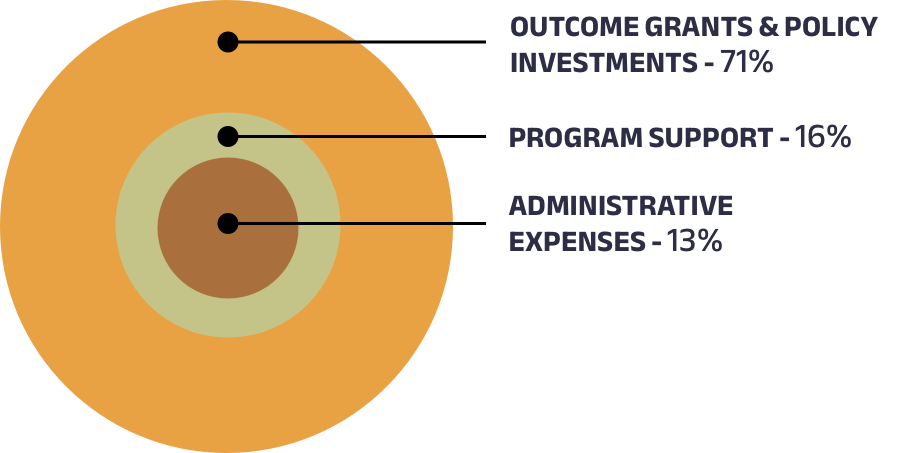

Play. Pause. Play. Pause.
In many ways, 2021 felt like pressing an old school CD player over and over. We began 2021 as a country with the promise of a COVID-19 vaccine and initial enthusiastic uptake, only to see deep divisions widen further as misinformation and distrust in government and public health experts gripped the citizenry.
The pandemic itself showed signs of slowing, holding the promise of a return to some type of normalcy, only to rear its ugly head as new variants emerged. Racial violence and public policies that seem intentionally designed to punish the poor were increasingly met with resistance and calls for change.
Like many institutions, the REACH Foundation did its best to adapt—foremost by listening to the needs of our community. As we monitored widely varying vaccine uptake rates across our six-county service area, we responded by partnering with our regional health foundation peers and allocating additional funds to trusted organizations in communities where the disparities were greatest. The REACH team also continued to refine and streamline our application requirements and processes to ease the burden on an overtaxed nonprofit safety net system.
REACH collaborated with other foundations, advocates, and local and state governments to leverage and focus our collective resources on emerging issues including uptake and adoption of telehealth, implementation of Medicaid expansion in Missouri, and strengthening the capacity of Black-led organizations in the Kansas City metro area to address social determinants of health and advance racial equity.
The Board of Directors’ strategic planning process to develop a new 5-year Community Investment Framework began in late 2019 and similarly was marked by starts and stops until brought to a conclusion in 2021. Although this new framework, which will guide our grantmaking starting in 2022, seems familiar, there are some new elements and opportunities to delve deeper into issues that affect the healthcare workforce, underserved populations and an informed and engaged citizenry. We’re grateful the REACH Board was insistent we not stick to the same songbook for the next five years.
We invite you to join the health equity chorus and learn how our many partners share and express our vision of all people in our communities achieving equitable health outcomes.
Jon Marshall, REACH Board President
Brenda Sharpe, President and CEO
In 2021, the REACH Foundation partnered with the Health Forward Foundation and Wyandotte Health Foundation to establish the COVID-19 Vaccine Education Equity Fund, a shared effort to support community and grassroots vaccine education activities focused on Black, Latinx, immigrant and refugee, rural and other underserved populations. Together, the three foundations awarded 28 grants totaling $271,600.

awarded through the COVID-19 Vaccine Education Equity Fund
total COVID Response Funding, March 2020 – December 2021
REACH continued to allocate the majority of funding through three outcome areas. The Strong Safety Net outcome area represented the largest portion, with $1.5 million of the total dedicated to core operating grants. Close the Coverage Gap included introduction of Centering Black Voices, an effort to close the resource gap for Black-led nonprofits. Enroll All Eligible maintained a focus on outreach and enrollment assistance for health coverage and other public benefits.




The pandemic presented REACH with the opportunity to serve Johnson County, KS government by assisting with allocation of grants to support Johnson County-based mental health, behavioral health, and substance misuse or abuse treatment and services. REACH established an application process and awarded 17 grants totaling $1 million. The funding was designated to support operating expenses related to clinical care, case management, administrative expenses and COVID-19 testing and vaccine support.
REACH served in a similar role for Johnson County Government in 2020, awarding nine grants totaling $160,455.

REACH continued investments in advocacy, policy research and voter education, awarding $100,000 in grants to The Voter Network and ACLU Foundation of Kansas as part of an ongoing integrated voter engagement initiative. Other funding included grants to support analysis of regional population trends identified through the 2020 Census and an economic study of health costs to Kansas resulting from the state’s decision to forgo expanding Medicaid.

Enrollment assistance has been a focus since 2016. Grants included outreach and enrollment for health insurance including Medicare, Medicaid and healthcare.gov, and assistance with social service applications, including Supplemental Nutrition Assistance Program (SNAP), Temporary Assistance for Needy Families (TANF), and other public benefits. Grants were directed toward underserved populations, such as immigrants and refugees, rural and homeless populations and those with persistent mental and behavioral health conditions.

Strong Safety Net represents the largest allocation of funding. Within this outcome area, 30 health care, advocacy and policy, and coordinating organizations received $50,000 unrestricted core partner grants, totaling $1.5 million. Investing in the work of care connectors is another key strategy. Nine organizations were awarded grants totaling $358,822 to support care coordinators, navigators and community health workers to help medically underserved individuals secure health services.
Recognizing that Black-led nonprofit organizations in the Kansas City region have not had equitable access to philanthropic funds and networks, the REACH Foundation launched the Centering Black Voices leadership development pilot, beginning with $20,000 grants to six, Black-led organizations. A Kansas City-based consulting group, Rooted Strategy LLC, worked with the cohort to identify professional development needs.
“It’s time the foundation be more deliberate in engaging leaders within the Black community to ensure we’re partnering with people who are most deeply affected by persistent inequities in our health care systems. We expect this work to alter how the foundation approaches collaboration and funding relationships with all of our grantee partners into the future.”
The 2021 year wrapped up grantmaking tied to the previous strategic plan, which covered the years 2016 to 2021, and marked the start of strategic planning and development of a new investment framework to guide grantmaking and community investments for the next five years.
Under the 2016-2021 strategic plan, the REACH Foundation directly invested $29 million in its service area through grants and other assistance, with $16 million (55%) of this total allocated to support the regional safety net infrastructure.

The REACH Foundation is governed by a 17-member board of directors who reside within the foundation’s six-county service area. REACH Board members bring diverse demographic and life experiences, passion for the communities where they live and work, and governance, civic, nonprofit and business expertise.

The REACH Foundation’s assets totaled $161 million at year end 2021, with an annual investment return of +16.2% for the foundation’s portfolio.
The investment performance gains in 2021 were notable – resulting in the highest year end asset balance in REACH’s history. Since inception, the investment return for the foundation was +6.9% through December 31, 2021.
Over the course of the 2016-2021 strategic plan, REACH invested $29 million in grants supporting the foundation’s three outcome investment areas and other mission-related efforts. REACH also made $7 million in indirect investments toward the mission via personnel, technical assistance and convening support. Together, these direct and indirect mission-related investments represented nearly 90% of the foundation’s total spending during the prior five years.
After accounting for approximately $40 million in spending during the period spanning 2016 to 2021, REACH’s asset balance still increased by $39 million during the six-year period that ended December 31, 2021. This spending and investment approach continues to demonstrate the foundation’s commitment to serving as a reliable partner for grantees and investor in regional health care outcomes for years to come.
